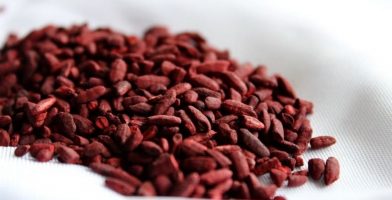Best Iron Supplements Reviewed
Disclosure: We use affiliate links and may receive a small commission on purchases.
Iron is a vital mineral that is an integral part of the body’s ability to maintain healthy blood and energy maintenance. Most of the iron in your body is present in red blood cells. Red blood cells (RBC’s) are cells that transport oxygen from the lungs to the tissues of the body and eliminate carbon dioxide waste from tissues. Iron also creates energy from nutrients that are ingested, plays a role in healthy nerve impulse generation, and also helps support normal immune function. There are multiple categories of people that would benefit from iron supplementation. Health conditions such as anemia, exercising frequently, and donating blood are all factors that can contribute to low iron levels. Also, studies have shown that the number one cause of fatigue in women is low iron. While most people get all of the iron they need from a normal diet, vegans can also be at a risk for low iron, as meat is an important source of iron in most diets. With all of these lifestyle habits that could lead to low iron, and therefore lower energy levels, where can you begin when looking for an iron supplement?
General Information
Iron is a naturally occurring compound found in a variety of normal diets, and is required for a plethora of healthy physiological functions. Consuming meats and whole grains can provide you with a healthy supply of iron, but, lifestyle habits such as frequent exercise, veganism, and blood donation can contribute to the formation of an iron deficiency. Iron supplementation has been proven to aid those with iron deficiencies as well as those who lead active lifestyles and are looking for an energy boost. Incorporation of iron rich foods and an iron supplement may give many benefits and lead to overall wellness.
In addition to this, there is a wide variety of iron supplements currently present in the market. With multiple forms of iron, a large array of different formulaic combinations to combat side effects, and liquid and solid modes of consumption, it can be quite daunting attempting to pinpoint a good supplement for you. Being diligent and knowing about the manufacturers you are purchasing from is an important starting place for consumers looking for a new supplement.
There are two main differences you will experience in iron supplements:
Type of Iron
Most supplements come in some form of ferrous iron, a form of iron that easily digestible. There are different types of ferrous iron, and each type may have a different effect on the subsequent user. In order to determine the best form of iron for your diet, speak with your doctor about your specific iron levels and requirements for supplementation.
Type of Blend
Many of these formulas have some kind of vitamin and mineral formula, or herbal concoction that is meant to aid in absorption and ability for the stomach to completely digest and absorb the iron. The type of blend that is best for you depends on multiple factors, and by discussing your unique needs for iron with your doctor, you can better determine what will be safe and effective.
Our Top 3 Picks
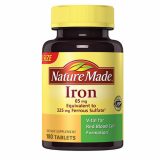
- Nature Made Iron
-
Our rating - Hard Capsules
- Price: See Here

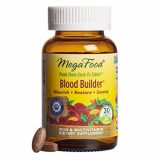
- MegaFood Iron
-
Our rating - +Vitamin C
- Price: See Here

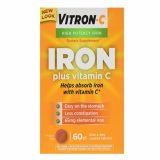
- Vitron-C Iron
-
Our rating - Ferronyl Iron
- Price: See Here

Why Iron Supplements?
When considering adopting an iron supplement regimen, there are multiple health conditions and lifestyle habits that could result in an increased risk for iron deficiency, and therefore decreased ability to convert food to energy, as well as decreased oxygen metabolism. The main condition that iron supplementation can aid is anemia, and it can also help replenish iron stores that can be depleted by other lifestyle habits:
Anemia
Anemia is defined as a condition that results in decreased numbers of red blood cells in the blood. Iron deficiency anemia is caused when your red blood cells do not contain enough iron, which can severely affect proper function. Iron aids in hemoglobin function, and therefore the ability of RBC’s to transport oxygen. Without iron, RBC’s are far less effective in the oxygen metabolism, resulting in difficulties keeping the body sufficiently oxygenated. Iron deficiency is the most prevalent cause of anemia in America. People who suffer from anemia generally experience fatigue, weakness, and dizziness. There are several causes of iron deficiency including:
Pregnancy

The normal recommended dosage of iron for women is 15-18 milligrams of iron daily. For a pregnant woman, this dosage increases to 27 milligrams per day due to the increased oxygen costs that nursing mothers require. Nursing mothers require more oxygen to support the baby’s oxygen needs as well as her own due to the increased respiration between mother and fetus, and therefore the body requires more iron to facilitate increased RBC and hemoglobin function.
Exercise
People who exercise are at an increased risk for anemia due to increased oxygen requirements. During exercise, our body’s oxygen metabolism increases; requiring increased use of RBC’s to supply the muscles with the oxygen they are demanding. While our bodies do adapt and become more efficient as we get in better shape, researchers theorize that athletes may require increased iron to supplement efficient RBC function. While females who exercise are at an increased risk of iron deficiency anemia, anyone who exercises could benefit and have peace of mind from adding iron supplementation.
Iron Depleting Medications
There are some medications that have been shown to affect the body’s ability to absorb iron. These medications are very commonplace, and act by inhibiting irons ability to function with hemoglobin and be absorbed properly. These classes of medication include:
- Quinolones, an antibiotic family including ciprofloxacin
- ACE inhibitors for blood pressure
- Tetracycline
- Zantac and Prilosec
If you take any of these medications, talk to your doctor about adding an iron supplement to your regimen.
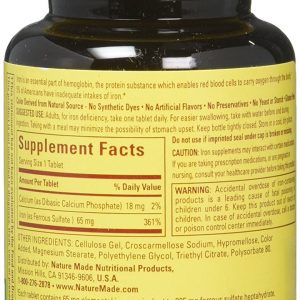
ADHD
In 2014, a study from the Annals of Health and Medical Science Research indicated that low-serum iron levels may be associated with ADHD, and that iron supplementation could help to alleviate symptoms and increase focus. This may be due to the role iron plays in nerve cell stimulation and regulation.
Side Effects
While iron supplementation has many use cases and benefits, there can be some side effects. These side effects include stomach pain, constipation, diarrhea, black stools, nausea and vomiting. While these side effects are rare, staying within the healthy limits of iron supplementation as outlined by your doctor can help to prevent any side effects from occurring.
10 Best Iron Supplements
1. Nature Made
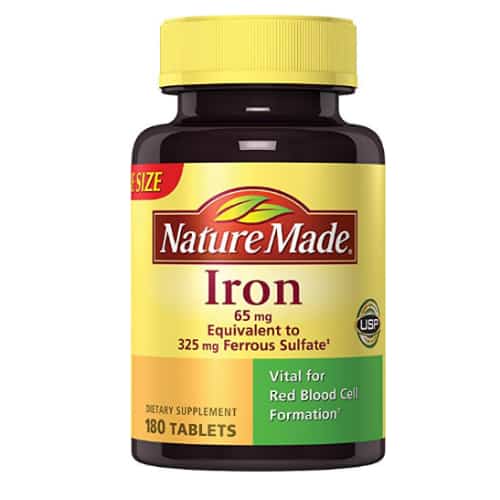
Contains 300% the daily amount of iron to aid those with anemia
No bad taste due to hard capsules
Can result in dark stools
2. MegaFood Energy
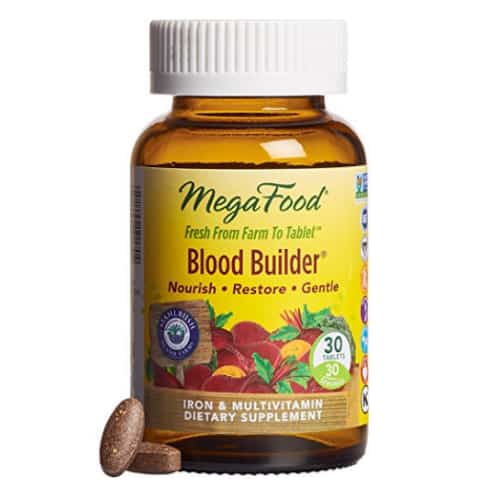
More efficient absorption of iron in your metabolism
Contains other nutrients like beetroot to aid in increased energy
Easily digestible
Can result in constipation
3. Vitron-C
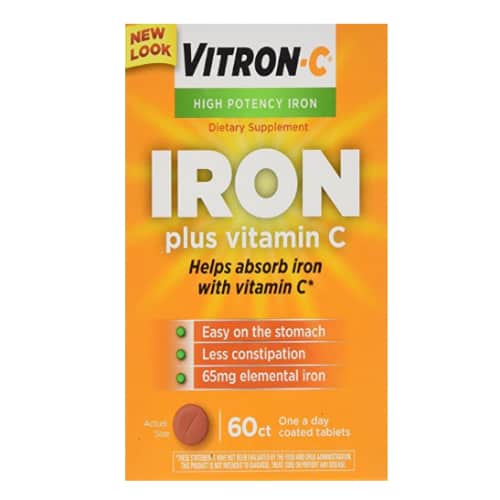
Utilizes ferronyl iron, a form of the mineral that has a higher iron concentration
Lower price
After taste
4. Garden of Life
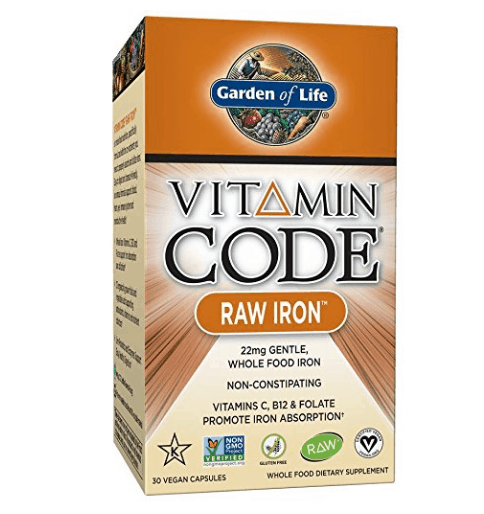
Easier on stomach for vegans due to natural source
Pro-biotic formula
Chance of allergic reactions from natural ingredient sources
5. Solgar
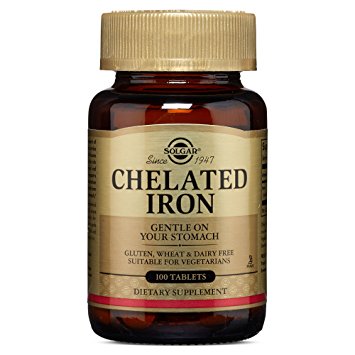
Utilizes unique form of chelated iron, iron biglycinate
Lower dose of iron than some supplements, less chance of side effects
Although rare, can cause headaches and fatigue
Harder to swallow tablets
6. Feosol
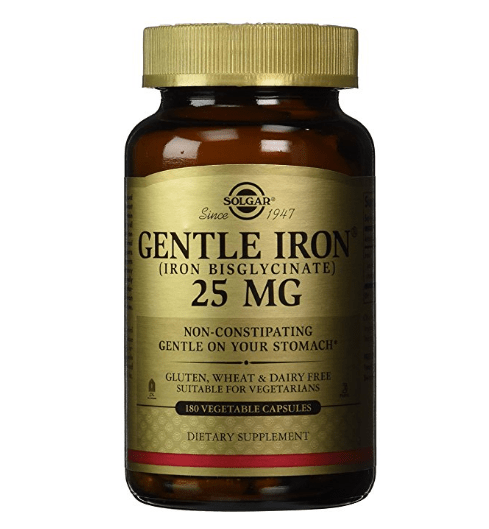
#1 recommended brand by pharmacists
Small and easy to swallow
Very effective for those with anemia
Bloating
Contains lactose for those are lactose intolerant
7. Pure Micronutrients
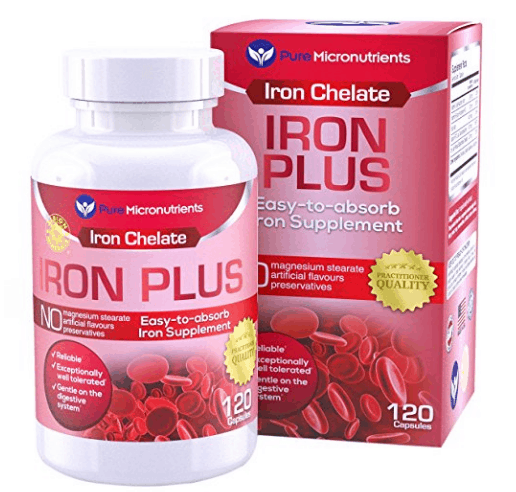
Fast acting and absorbing due to cofactors Vitamin C, B6, and B12
Less side effects due to slower overall absorption
Takes longer than average medication to take effect
8. WELLESSE Liquid
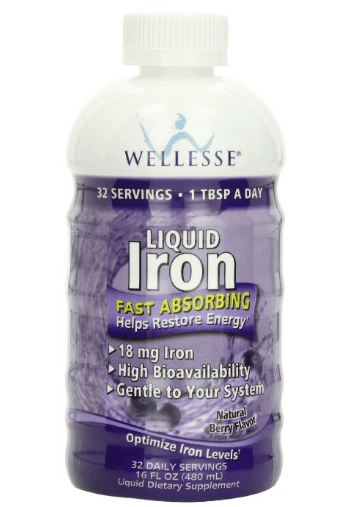
Fast absorbing and great tasting
Amino acid chelate iron form results in decreased risk of side effects
No swallowing pills
Can be hard on the stomach if portions not properly maintained
Taste quality is subjective
9. Pharmics Ferretts
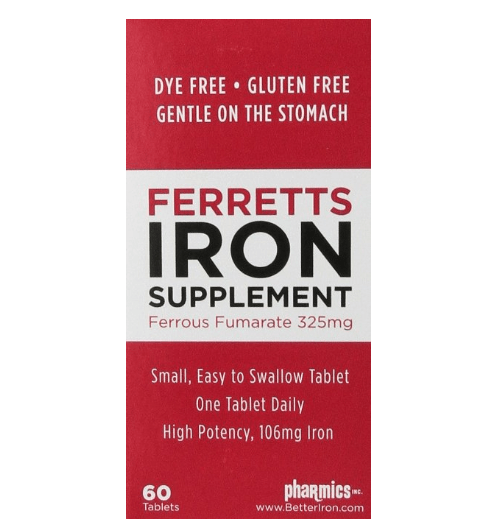
Is gentle on the stomach
Increase energy naturally
Constipation side effect reported in some users
10. Rainbow Light
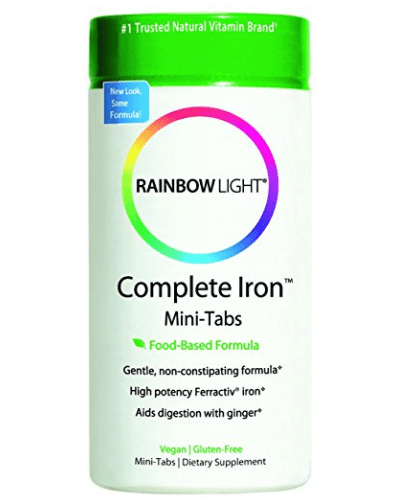
Plant Based formula
Ferractiv iron is a non-irritating form of iron, easily digestible
Helps to maintain healthy oxygenated blood
Pills are larger than average
Some constipation risk, if prone to this
Benefits
Iron is an important mineral and has a very important function in our respiratory as well as our nervous system. As we discussed earlier, it helps red blood cells carry oxygen and also plays a role in transmitting nerve impulses, can help ADHD patients, and has even been shown to have an effect on eyesight.
Supplementing with iron has been proven to increase energy, focus, eyesight, and help muscles utilize oxygen more effectively. There are many options on the market for iron supplementation, and iron can come in multiple forms that can be confusing to discern, so how can you make sure to find the best supplement for you?
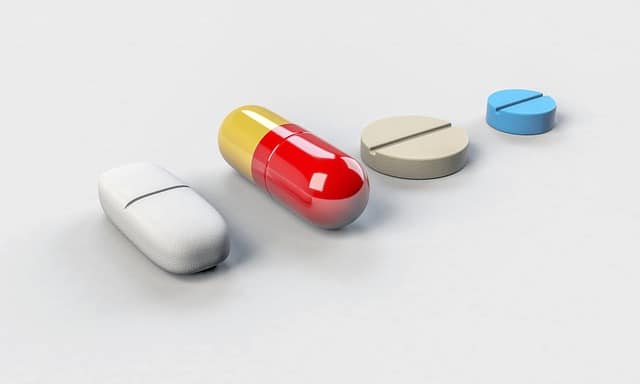
To begin, iron comes in two forms:
Heme Iron
- Is found in meat, poultry, and fish
- Heme iron is bound to hemoglobin, making it easiest for the body to absorb
- Can upset stomachs of those not accustomed to eating meat
Non-Heme Iron
- Iron that is not bound to hemoglobin, not as easily absorbed by the body
- Comes from wider range of dietary sources
- Found in supplements in three different forms: ferric, ferrous, and carbonyl
- Easier absorbed by body when combined with Vitamin C
- Most common form found in iron supplements
Which form of iron should you take?
Depending on dietary habits, presence of anemia, and exercise habits, the type of iron supplement you should take is based on your body’s tolerance. The body more easily digests ferrous forms of iron if you are a vegetarian, and the carbonyl form is even easier on the gastrointestinal system because of decreased toxicity. Most supplements contain either a variation of the ferrous form or the carbonyl form due to ease on the stomach for most patients, and deciphering which form of iron is present in your supplement is as easy as glancing at the ingredients list. Most supplements will clearly state whether it is vegetarian friendly, the form of iron, and any accompanying chemicals that may facilitate better absorption and decreased side effects. Each form of iron has its own set of benefits, and finding the correct supplement depends on your body’s specific needs and tolerance to the form you are ingesting.
Usage Recommendation
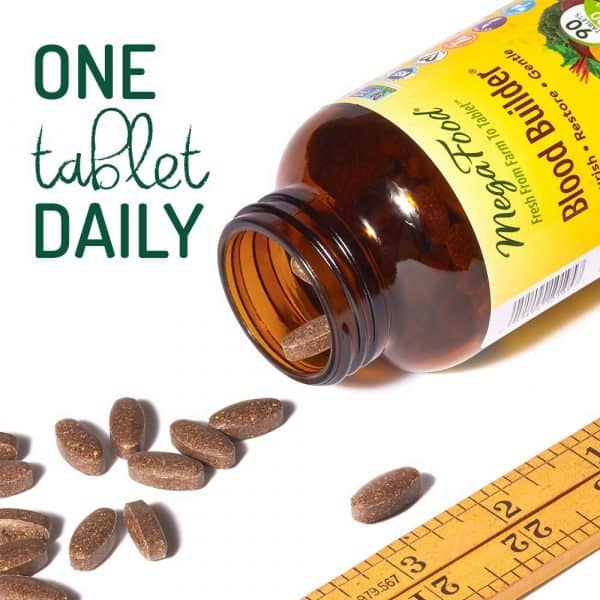
While studies have shown that iron supplements are most efficiently absorbed on an empty stomach, they have been shown to sometimes cause stomach discomfort, nausea, and diarrhea. Taking your supplement with a small amount of food and paying attention to types of iron that agree best with your body may help to combat these side effects. Ingesting milk, calcium, and antacids within two hours of your iron supplement can cause damage and should be avoided. Foods heavy in fiber, as well as caffeinated beverages, should also not be consumed in conjunction with iron due to the chance of developing stomach and digestion issues. Doctors have stated that taking a vitamin C supplement or drinking orange juice along with your iron pill cam aid in more efficient absorption as well as decreased risk for side effects. Iron supplements come in liquid or solid tablets, with capsules and tablets being the most popular form due to taste differences.
Precautions and General Information
Like most supplements, side effects can become common if normal dosage recommendations are not adhered to. Iron is a natural compound that is found in a lot of common foods we as humans consume on a daily basis, and therefore is safe to consume in a supplement for those at risk of having an iron deficiency. It is not well understood by researchers why some people are more prone to side effects of iron supplementation than others, and they think it relates to the form of iron that is being ingested. It is important to pay attention to the type of iron that is present in your supplement, and to understand why you are choosing it. Higher dosages (>30mg) are more tailored for people who are at risk for iron deficiency, and while these levels are not dangerous, they leave the user at a higher risk for side effects. Some of the common side effects of taking an iron supplement include fatigue, nausea, dizziness, constipation, and upset stomach. If you experience any of these effects, stop use and consult your physician.
Criteria for Evaluation
The supplement industry as a whole is booming right now, and finding real, authentic products is very important in navigating the very inundated landscape. To help you navigate the many options available, we have curated a ten best list above, and below is where we describe the criteria used to determine these 10 best supplements. We take in factors from many different sources including consumer, brand, and research findings. By organizing reviews, safety information, usage guidelines, and more, we hope to allow you to find your ideal iron supplement with ease.
Product Testing
Ensuring he product you are taking has been tested and is reputable is an important factor to consider, as this step determines safety and effectiveness. How can you test each product? Well, that is where we come in. We curate products with specific benefits, such as how Rainbow Light is formulated specifically for vegans, and how the MegaFood supplement contains a blend that facilitates increased energy and absorption. These are claims that we pay attention to and factor into our analysis to provide you with a streamlined buying process.
User Reviews
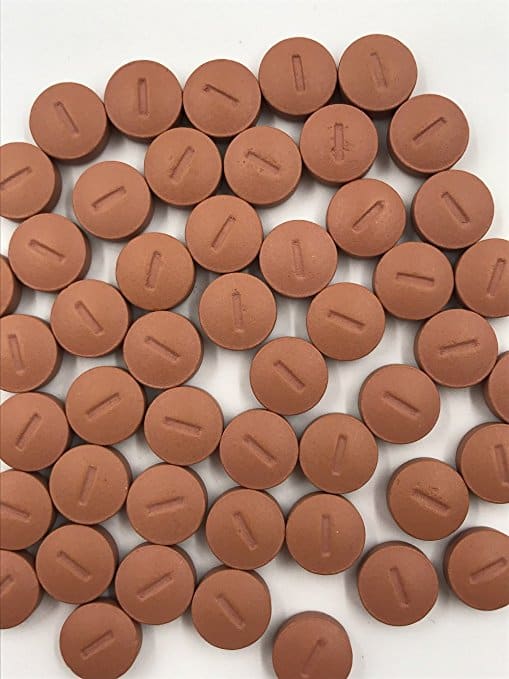
Research has shown that iron supplementation can affect different people in different ways, and with so many different blends and methods of consumption available, how can you best decide which one? Luckily, there are large numbers of users who report their unique experience with each product and provide reviews. These reviews result in a pool of information that can be analyzed and factored into an overall synopsis of the product that can help to narrow down the list of supplements on your radar. Having a large number of people test a product before you buy it makes it much easier to gauge which product fits your individual criteria. Therefore, it is important to understand how different people are reacting to these supplements. We go through many reviews of each product, good and bad, to understand the actual results people are experiencing from using these products. By understanding what each product is actually achieving through previous users, you can better match yourself, understand what to expect, and know how to match yourself to a product.
Potential Side Effects

One of the main pain points people experience when searching for a good iron supplement is the potential side effects. It seems that side effects such as constipation, nausea, and upset stomach are symptoms that are hard to avoid, and occur randomly on a case-by-case basis. We have curated this easy to follow list of iron supplements in order to supply the consumer with information to help them combat this probability. There are many great iron supplements that have created great products based on meticulous research to help prevent these grievances. Herbal blends, vitamins, and different forms of iron are strategies that brands are using to try and create a better experience for users. Being careful not to overdose and understanding your body’s iron needs can help to minimize your chance of experiencing side effects. Contact your physician to discuss your options and to learn more about how iron can affect your individual body.
Manufacturer Reputation
The notoriety and respect a brand carries should factor into any buying decision. When dealing with products that can affect your health and physiology, it is key to understand who is providing this product and that they have pure intentions for their consumers. Well-respected brands such as Nature Made, Garden of Life, and Solgar are included on our list because of their mission and great market reputation.
Safety of Supplement
It is very important to be aware of what is contained in pills that you ingest, and we must trust these products to not include ingredients or chemicals that are dangerous. Iron is a natural mineral, and the only danger in taking it is in what other chemicals the manufacturer has included with it. All of the products listed on our list contain no harmful chemicals and are safe and beneficial to ingest. Be mindful of any allergies or dietary restriction you may have, and discuss with your doctor any potential risks involved before beginning an iron supplement regimen.
Ingredients and Effectiveness
Nearly all iron supplements contain additional ingredients to help facilitate absorption and decrease any chance of side effects becoming apparent. These ingredients are always available on the ingredients list of any product. The main ingredient will always be the type of iron used (as discussed previously), among other ingredients used in the capsule and for absorption and function. We advise reading a full ingredient list before beginning use of any product.
How Much Iron Is Too Much (When It Comes to Iron Supplements)?
Iron is very important to body. If you do not ingest the proper amount of iron, your body will not be able to create the red blood cells that is required to carry oxygen around your body where it is needed. Iron also aids in producing adenosine triphosphate (ATP). Your ATP is how your body supplies energy.
Supplemental iron has the potential to help bring a person’s iron levels to normal, if they are suffering from an iron deficiency. However, if you do take iron supplements, it is possible for you to take too much iron and experience poisonousness symptoms. Iron supplements and multivitamins that include iron can cause serious medical issues and even death if a person consumes too much. The maximum amount of iron a person can consume without severe side effects is forty-five milligrams per day.
Iron Intake Recommendation
For women, the endorsed nutritional allowance of iron is eighteen milligrams per day. However, pregnant women require at least twenty-seven milligrams a day. Men only require roughly eight milligrams a day. Yet, when a woman reaches menopause, her iron requirement will drop to that of a man’s; eight milligrams per day.
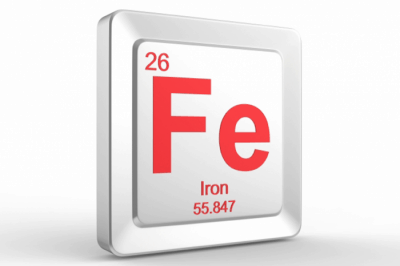
The most a person can consume of iron is approximately forty-five milligrams per day. However, if this person were to ingest more iron than this from supplements on a daily basis, then harmfulness symptoms are more than likely to happen.
The Early and Late Stages of Toxicity Symptoms
The symptoms that are brought on from an overdose of iron progress in the body through stages. The earliest of symptoms can begin slowly and some may not even show any signs of an iron overdose. When the symptoms first start, it can last for a few hours and stop. However, it may return in a day or so.
It is proven that the faster you receive treatment for an iron overdose, the greater chance of recovery you will receive, especially if there are no symptoms that have occurred during two days of the overdose. However, it has been reported that almost ten percent of people whose symptoms progressed into severity can die within six hours of the associated overdose.
Early signs
The early signs and symptoms of iron poisoning encompass the intestines and stomach. Some symptoms that a person can experience include tense abdominal pain, diarrhea, and vomiting that can sometimes include blood. Other early symptoms of an iron overdose include lethargy as well as irritability. It has also been noted that some more severe symptoms that occur during the first few days may include an increased heart rate as well as breathing. You could also experience a decrease in blood pressure that is linked to shock. An additional symptom can also include coma.
Late stages
In the later stages of an iron overdose, the iron builds up in the body’s organs and the symptoms start to become even more severe. Depending on the seriousness of the overdose, the symptoms can happen anywhere between twelve hours to five weeks after consuming too much iron.
The person can start to experience a decrease in blood sugar levels, a fever, and have seizures. Subsequently, a couple of days later, the iron builds up in the liver and begins to damage the organ. Symptoms from this type of liver damage can contain jaundice and bleeding. The iron can also cause scarring in the intestines as well as the stomach, which can ultimately lead to a blockage in the person’s digestive tract. The reason death can occur is due to the build up from the iron in the liver, the hearts, as well as the endocrine glands, like the pancreas.
Overdose Symptoms
Symptoms to look out for that is caused by an iron overdose include diarrhea, black stools, nausea, vomiting blood, stomach pain, fever, a metallic taste in the mouth, and headache, which can sometimes, yet not always, happen within an hour of consuming too much iron supplements. However, if you do not seek treatment, then more severe overdose symptoms that one could experience can include drowsiness, dizziness, chills, fast or weak pulse, low blood pressure, or flushed or pale skin.
Concerns
If you have any concerns about your iron levels, it is important to have them checked by your physician. They can prescribe the suitable dose of iron supplements if you require them. It is also crucial that you do not take any iron supplements without the approval of your doctor because they can interfere with the absorption of other medications such as certain antibiotics, carbidopa, levodopa, and levothyroxine.
It is important to note that postmenopausal women are less likely to suffer from an iron deficiency because their body does not require the same amount of iron as women of childbearing age.
Those who do not have a low iron level should definitely avoid taking any iron supplements and multivitamins that contain iron due to the serious risk of iron toxicity. It is important to always consult your health care professional because consuming iron supplements.
Iron Supplements in Infants/Children

When it comes to infants, iron deficiency and iron deficiency anemia can have a long-term adverse effect on behavior and neurodevelopment. Some of these effects may also be irreversible.
Babies and Children
Iron not only provides the means of transporting oxygen throughout the rest of the body in infants and children, but also aids in developing their brains normally.
Some symptoms that are apparent when a baby or child has an iron deficiency include no appetite, pale skin, irritability, and/or slow weight gain. Babies that have an iron deficiency are more likely to develop slowly and are also less likely to be physically active.
Iron deficiency in children can affect how they function while in school. If a child does not consume enough iron, they can have a smaller attention span, problems concentrating, and poor educational performance. This is because when iron levels are low they can make anyone feel weak and tired.
How Much Iron Do Babies and Children Require?
While still in the womb, babies receive a reserve of iron that comes from their mother’s blood that lasts for a few months after their birth. During the first six months of a baby’s life, if they are breastfed, they will receive the iron they need from their mother’s milk. However, if breast feeding is not a choice, it is best to use an infant formula that is iron fortified for the first nine to twelve months. When your baby begins eating solid foods, the volume of iron that they require is determined by their age.

For babies between the ages of seven to twelve months have a recommended 11mg of iron per day. Babies between the ages of one and three should receive 7mg of iron a day. Children between the ages of four and eight years of age should receive 10mg of iron per day. Children between the ages of nine and thirteen years old should receive 8 mg per day.
After these children have hit puberty, iron intake is distributed differently between males and females. Females between the ages of fourteen and eighteen years old should receive 15 mg of iron per day while males of the same age should consume 11 mg per day.
Iron Deficiency Risk Factors in Children
Infants and children who are at a higher risk of developing an iron deficiency include:
- Premature babies born more than three weeks before their due date or having a birth weight below 6.5lbs
- Babies that consume cow’s milk or goat’s milk before one year of age
- Babies at six months of age who are breast-fed and are not given complementary foods containing iron
- Babies who consume formula that is not fortified with iron
- Children between the ages of one to five who consume more than twenty-four ounces of cow’s milk, goat’s milk, or soy milk per day
- Children with certain health conditions such as restricted diets or chronic infectionsChildren between the ages of one to five who have been exposed to lead
- Adolescent girls due to their bodies losing iron during menstruation
Your infant or child could have an iron deficiency that is causing them to be irritable, tired, and losing focus at school. However, it is important that you first bring your concerns to your child’s physician. Tests will be performed in order to determine whether an iron deficiency or anemia is the cause.
It is important to first ask your child’s doctor if iron supplements would be beneficial to your child. There are many factors that have to be taken into account because not every child needs the same amount of iron.
If you allow your child to start an iron supplement without consulting their physician first, you could be facing some dire situations.
Should You Take Iron Supplements to Fight Fatigue?
Having an iron deficiency can leave a person feeling lethargic, weak, or a lack of energy. However, these symptoms can be caused by various other mineral or vitamin deficiencies. It is important to first visit your physician if you continue to have episodes of tiredness or low energy in order to eliminate any underlying diseases or conditions.

Most doctors and other medical practitioners will not suggest taking iron supplements for fatigue unless you have been checked for any other causes. Your physician will want to take a thorough medical history to search for any other health issues, such as disorders that can interfere with your sleep like sleep apnea, or conditions that can zap your energy such as stress, hypothyroidism, or boredom, that could be affecting your energy.
If your medical history shows no reason for your exhaustion, then your physician will want a blood test. This test will count your red blood cells. If the results conclude that they are low, then your physician may order a specific iron test to be taken. When your iron levels are low, this is a condition called anemia.
Understanding Energy and Iron
One of the most common symptoms of an iron deficiency is a lack of energy. When you have low iron levels, your blood cannot transport oxygen throughout your body efficiently, which can affect your mood, concentration, work performance, and your energy. The Centers of Disease Control and Prevention has stated that iron deficiency affects a large amount of American citizens and is the leading source of anemia in the United States.
Find Alternative Sources for Iron
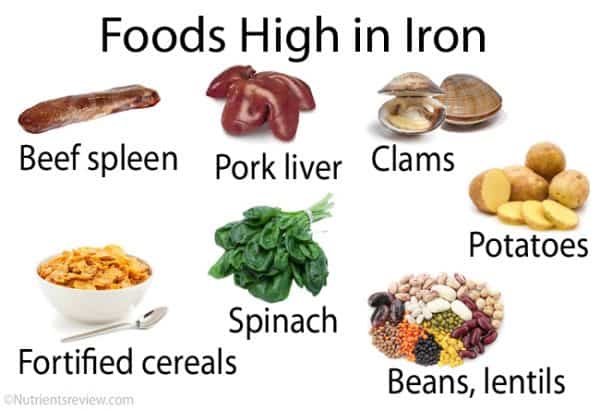
If you feel that the reason behind your low energy is caused by a lack of iron, you should first try to consume more foods with iron before running straight for the supplements. Supplementation is not that necessary for people in the U.S. due to the availability of a wide array of foods. If you do not know where to start, you should look at foods that are rich in iron such as red meats, beans, clams, and leafy vegetables. Doing this will increase your iron intake in a more healthy and natural way.
Women and Low Iron
Women need more iron than men due to menstrual bleeding, which can result in women feeling fatigued and low of energy after menstruation. They also need to put back the iron that their body has lost through their periods. If this cannot be successfully achieved through a diet, then many women may find iron supplementation beneficial.
Caution
If you change your diet to more iron rich foods but you are still experiencing low energy, then it may be time to consult your physician. There are certain medical issues, such as bleeding in the intestines or gastrointestinal disorders, which can cause low iron levels. Due to this, as well as the danger of an overdose, iron supplements should only be taken if advised by your physician.
FAQs
Why do some products contain 65mg, when the maximum dose is supposed to be 45mg?
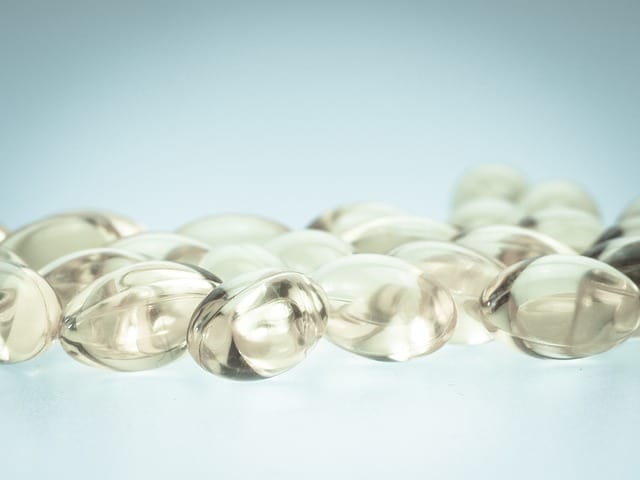
Some health conditions require a higher dose of iron in order to bring iron levels back to normal. Consuming this amount without a need for iron like exercise, blood donation, or pregnancy could result in unwanted side effects.
What is the difference between ferrous fumarate and ferrous sulfate?
Ferrous fumarate is known to have a smaller incidence of gastrointestinal incidences than ferrous sulfate, as it is less toxic.
I have low iron levels and still experience side effects, how can I combat these?
The best course of action is to see which form of iron and what kind of blend was present in the supplement you were taking, and search for alternatives to it. There are plenty of options in today’s iron supplement market.
Where can I purchase these supplements?
These supplements can be found at most pharmacies and general health stores, and Amazon also provides all of these products in a much faster and convenient platform.
How should I take these supplements?
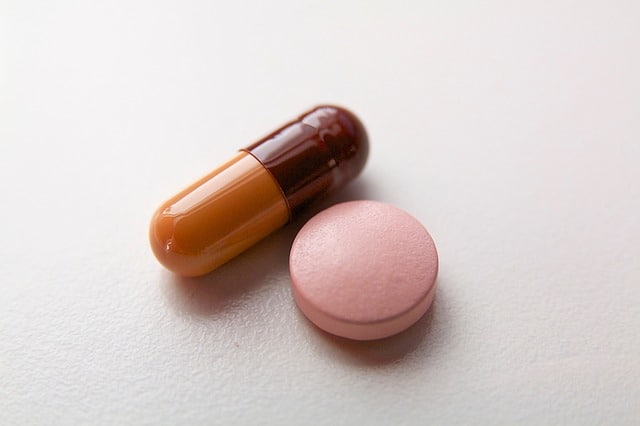
Please see our usage recommendations section above.
Where does the iron come from in these supplements?
The iron in these products featured above come in two separate forms, either a foodstate form or a chemical form. Foodstate forms are better suited for those with an uneasy stomach, history of iron supplement related stomach trouble, and who are looking for an iron supplement for purposes other than anemia. The chemical form is better suited for those with anemia due to its potency and efficiency.
Can I have an allergic reaction to any of these products?
There are a few products on our list that contain ingredients such as lactose, and other vegetable and fruit formulas. Before beginning a supplement regimen, you should always check the ingredients list for any potential allergies. The natural blends specifically have a higher incidence of allergic reactions reported.
Can they cause weight gain?
No, none of these supplements have been shown to be associated with an increased risk of weight gain.
Where can I get iron from naturally?
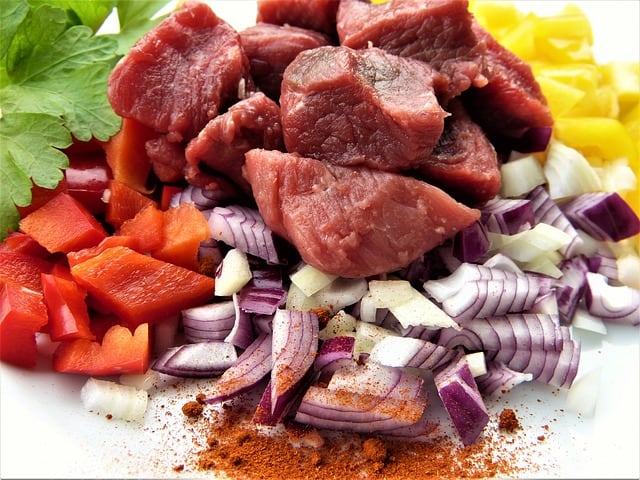
As discussed previously, eating meat, poultry, and fish provide most of the iron content in a normal diet. Foods with whole grains, seeds, and other nuts, as well as dark leafy vegetables, beans, and dried fruit can provide iron to a vegan diet. Maintaining a well-balanced diet can lead to healthy iron levels.






